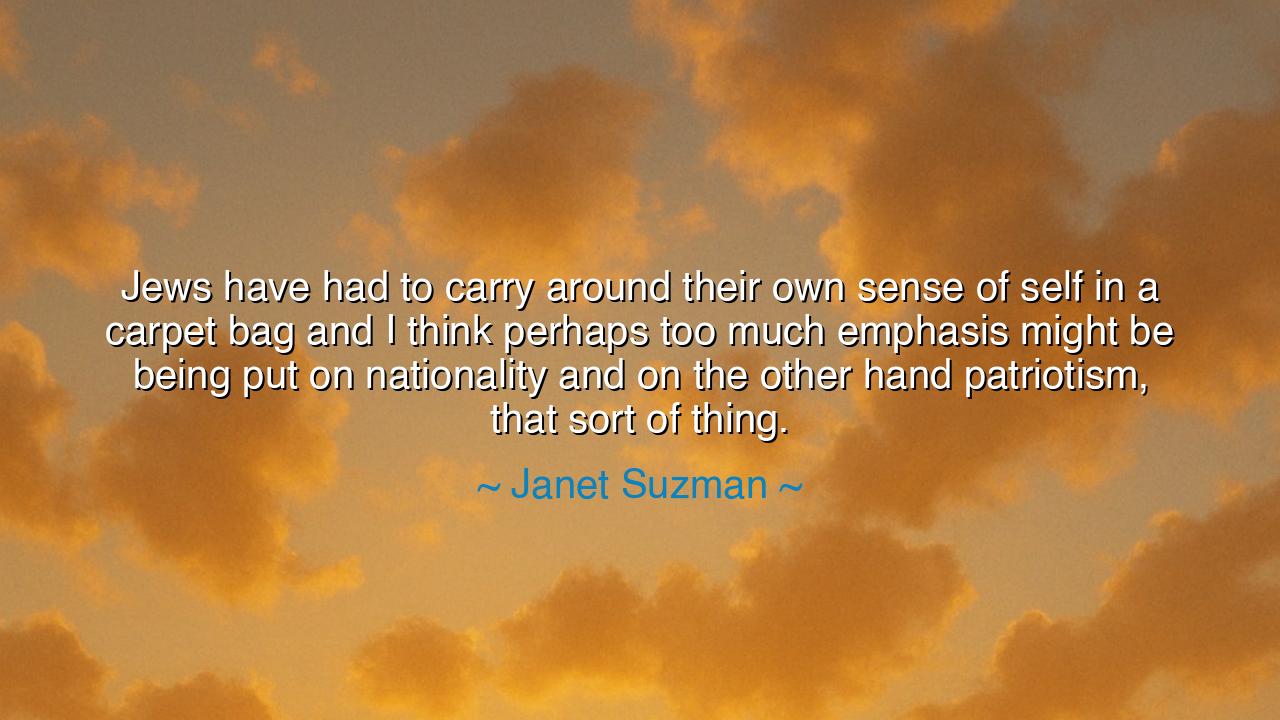
Jews have had to carry around their own sense of self in a
Jews have had to carry around their own sense of self in a carpet bag and I think perhaps too much emphasis might be being put on nationality and on the other hand patriotism, that sort of thing.






The actress and thinker Janet Suzman once gave voice to a truth steeped in centuries of sorrow and resilience: “Jews have had to carry around their own sense of self in a carpet bag and I think perhaps too much emphasis might be being put on nationality and on the other hand patriotism, that sort of thing.” In her words lies the weight of history, the exile of a people who for generations were wanderers, denied homeland, yet never stripped of identity. The carpet bag becomes a symbol of displacement—light enough to carry, yet heavy with memory, faith, and culture. For the Jewish people, selfhood was not secured by borders or flags, but by the strength of tradition and the unyielding preservation of spirit.
The ancients often taught that identity is more enduring than geography. A nation may be conquered, borders may shift, kingdoms may rise and fall, but the inner flame of a people cannot be extinguished if they carry it within. Suzman warns us that nationality and patriotism, while powerful, are not the ultimate measure of selfhood. For a people who have survived dispersion, pogroms, and exile, their essence was not tied to a single land, but carried within their stories, rituals, and memories. Patriotism, though noble, can become an idol when placed above the dignity of the human spirit.
History offers many examples of this truth. Consider the tale of the Jewish diaspora after the destruction of the Second Temple in 70 CE. Driven from Jerusalem, scattered across continents, the Jewish people were denied a homeland for nearly two thousand years. Yet, though stripped of territory, they did not vanish. They carried their sense of self in prayer books, in Torah scrolls, in family traditions passed from parent to child. Their identity was portable, unbroken, a living testimony that a people can survive without borders when their spirit is strong. Suzman’s words echo this resilience: true belonging is not always bound to the soil, but to the soul.
Her warning against the overemphasis on patriotism speaks to a danger that repeats throughout history. Nations, when obsessed with rigid notions of loyalty, have often turned against those who are seen as “other.” In medieval Europe, Jews were expelled from one kingdom after another, accused of lacking patriotism because they did not fit the mold of national identity. In modern times, nationalist fervor in Nazi Germany weaponized patriotism into persecution, branding Jews as outsiders even when they had lived in those lands for centuries. Suzman’s insight is that when patriotism grows too narrow, it suffocates those whose selfhood cannot be contained by it.
The meaning for us is clear: identity must be deeper than flags and stronger than borders. While love for one’s country can be noble, it must not overshadow love for humanity, nor the respect for those whose identity has been forged in struggle and wandering. The Jewish story is a reminder that survival depends not on passports or national anthems, but on the cultivation of memory, resilience, and faith. It is a lesson for all peoples: when nations crumble, communities endure; when patriotism falters, identity rooted in shared values carries a people forward.
Let this teaching pass into your own life. Do not define yourself solely by the lines of a map or the colors of a flag. Cherish your heritage, your family, your culture, for these are the treasures that can be carried in a carpet bag across deserts, seas, and exiles. Practice patriotism with humility, but never let it turn into exclusion or hatred. Build your identity on virtues that outlast governments: justice, compassion, courage, and truth. In this way, you will stand firm even when the world shifts beneath your feet.
Thus, Suzman’s words remind us that true belonging lives within, not without. Borders may confine, but the spirit transcends them. Nations may demand loyalty, but wisdom asks for balance. Remember the wanderers who carried their identity in exile, and let their story guide you: build your house not merely on soil, but on the enduring foundation of community, culture, and conscience. For these, unlike nations, cannot be taken away.






AAdministratorAdministrator
Welcome, honored guests. Please leave a comment, we will respond soon